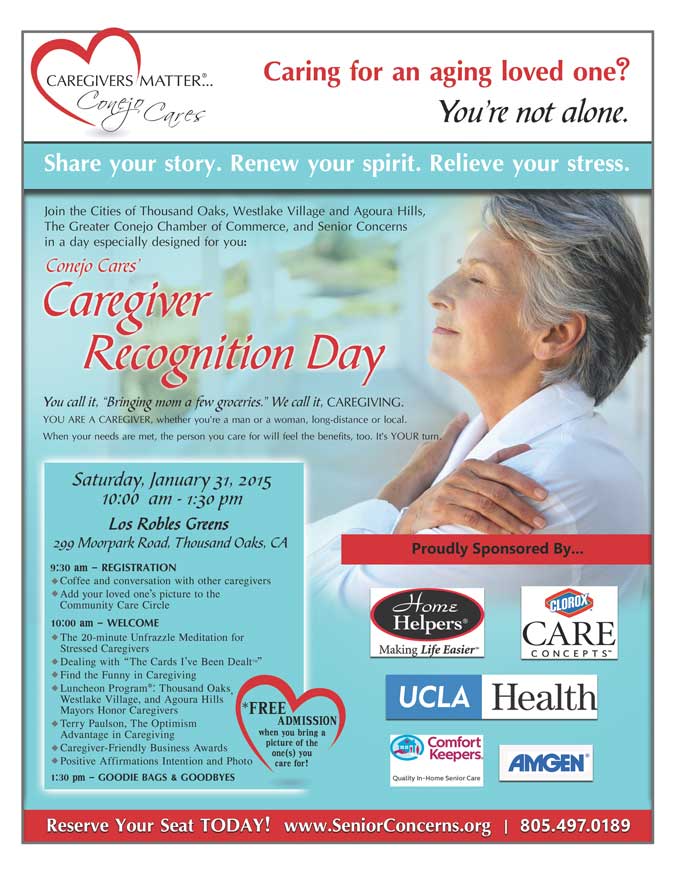 Our community is full of them.
Our community is full of them.
They often go unnoticed by friends and neighbors. Their role is not known to their employer. For many, their doctor is unaware of their situation.
They walk among us, shop among us, work among us—yet we don’t see them for what they are: family caregivers.
As you look around your workplace, your neighborhood or your doctor’s waiting room, you might be surprised to learn that one in five people around you are caring for an aging parent, a spouse, an elderly family member or friend with a chronic, debilitating or serious health condition.
“It’s not surprising that many of us don’t see these people in that light because most of the time family caregivers don’t identify themselves as caregivers,” said Carie Salas, care manager at Senior Concerns. “They identify themselves first and foremost as sons, daughters, spouses, friends and neighbors who happen to be providing a range of activities to support the health and well-being of a loved one—everything from paying their bills to providing personal care.”
When asked to provide an example of caregiving, many people will refer to paid in-home care or to those workers caring for individuals in a residential care facility or a hospital.
But these days, more and more family caregivers are coming out of the shadows. They’re sharing their stories, offering to guide fellow caregivers to valued resources and reaching out for help themselves.
In the safe space of the Gallagher family dining room this year, holiday dinner became a veritable caregiver support group.
One visitor talked about his close friend who quit her job and was providing full-time care for her 90-year-old estranged father.
Another guest, whose mother had died, recounted her struggles as a working caregiver trying to juggle a demanding job while her mother’s needs increased dramatically in the last year of her life.
One other guest had recently become a new caregiver after her husband had been diagnosed with a chronic illness requiring constant monitoring and medication.
While caregiving has become the new normal, recognition and resources are just beginning to keep pace with the need. For example, in November AARP hosted its first Virtual Family Caregiving Fair.
The Virtual Family Caregiving Fair is part of a new AARP National Caregiving Awareness Campaign that includes a contest encouraging people of all ages to be kind to caregivers. The Random Acts of Kindness for Caregivers contest continues through March and urges people to share a simple act of kindness with a caregiver.
Locally, efforts are underway to present the second annual Caregivers Matter: Conejo Cares Caregiver Recognition Day on Sat., Jan. 30.
Set to honor family caregivers for the work they do, Senior Concerns; the cities of Thousand Oaks, Westlake Villageand Agoura Hills; and the Conejo Senior Resource Network, a subgroup of the Greater Conejo Valley Chamber of Commerce, will host the event that encourages caregivers to share their stories, renew their spirit and relieve their stress from the challenges of family caregiving.
Anyone caring for a senior loved one age 65-plus is invited to attend. The care receiver may live anywhere, but the caregiver must reside locally.
The event features a half-day of presentations and activities designed to honor family caregivers in our community.
Caregiver Recognition Day will take place from 9:30 a.m. to 1:30 p.m. at Los Robles Greens, 299 S. Moorpark Road in Thousand Oaks.
Admission for the event is free.
As last year’s event was sold out, advance reservations are required and may be made by visiting www.seniorconcerns.org or calling (805) 497-0189.
Limited free in-home respite care is available by request upon reservation.
Family caregivers, come out and be counted. You deserve a special place in our community for the important work you do. Be honored. Sign up for Caregiver Recognition Day.